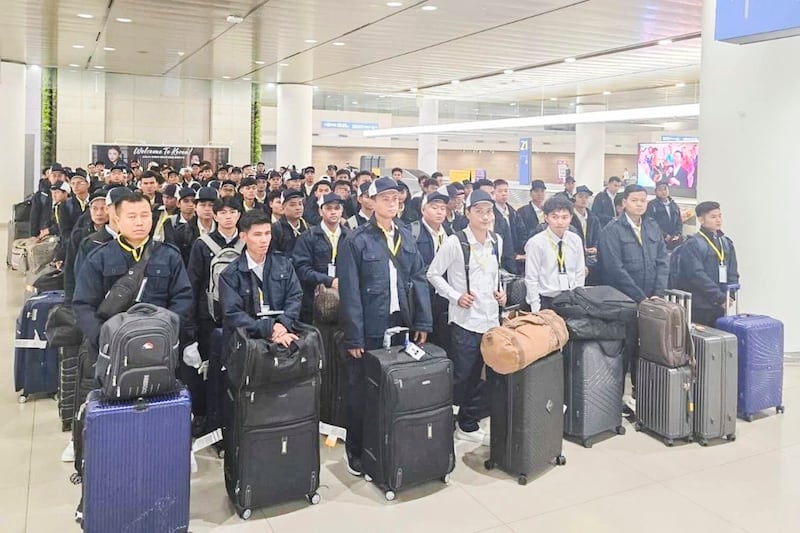Updated May 03, 2024, 04:39 p.m. ET.
Myanmar’s junta has banned all men from working abroad amid widespread public concern over the implementation of a military draft law.
Since Myanmar's conscription law was announced by junta chief Senior Gen. Min Aung Hlaing on Feb. 10, troops nationwide have attempted to press-gang large numbers into the military, which is seeking to shore up its ranks after a series of battlefield defeats.
It requires men and women aged 18 to 35 to serve in the junta's armed forces for two years – prompting more than 100,000 to flee their homes to avoid the draft, the Burmese Affairs and Conflict Study found last month.
The ban on men working abroad, which went into effect on May 1, is “temporary” and will remain in effect “as needed,” Ministry of Labor Permanent Secretary Nyunt Win told RFA Burmese on Thursday.
“Starting from May 1 … we will only be allowed to send [registered] women as migrant workers,” Nyunt Win said in an interview. “Men will not be able to register to work abroad during the suspension period.”
Nyunt Win said that men who had registered to work abroad by the end of April will be exempt from the ban, as will “a small number” of workers who made arrangements through intergovernmental employment agencies.
The labor secretary provided no reason for the suspension or indication of its duration.

The International Labor Organization estimates that more than 4 million Myanmar nationals work overseas with the largest number – approximately 2 million – in neighboring Thailand. It’s not clear what percentage of overseas workers are men.
Blocking would-be draft dodgers
However, a representative of an overseas employment agency in Yangon region’s Thingangyun township told RFA on Thursday that the restrictions on working abroad were likely imposed to prevent men from leaving the country amid implementation of the military draft law.
“The junta enacted the conscription law because it wants young men [to join the military],” he said, speaking on condition of anonymity due to security concerns. “Since the day the law was implemented, large numbers of men have been going abroad either officially or unofficially through various means.”
Political commentator Than Soe Naing agreed, saying the ban is likely "a consequence of insufficient enrollment numbers for the upcoming phase of military training."
"This announcement effectively prohibits adult men from leaving the country," he said. "It appears that such measures stem from challenges in enforcing military service regulations."
According to the Burmese Affairs and Conflict Study, the junta has carried out operations to enforce the military service law in 224 townships across the country. Approximately 5,000 young men were sent to 15 military training sites by the end of March, it said.
In addition, more than 2,000 people from 40 townships across Myanmar have been enlisted as militia fighters, the report found.
Workers left stranded
Kyaw Htin Kyaw, vice president of the Myanmar Overseas Employment Agencies Federation, told RFA that the junta's announcement poses challenges not only for those attempting to go abroad, but also for the employment agencies facilitating their services.
"Brokers who have already collected advance payments without rendering any services and those who have yet to establish connections with agencies will encounter difficulties," he said. "Primarily, the most vulnerable group affected by this situation is the workers themselves. With agencies unable to facilitate the migration of male workers, they will inevitably face repercussions as well."
Workers with plans to migrate overseas told RFA they were shattered by the announcement and left wondering how they would make ends meet in Myanmar, where the economy has been ravaged by junta mismanagement and widespread conflict.
Thein Ngwe, 27, said he had sold all of his mother's and older sister's jewelry and borrowed cash at exorbitant interest rates to pay the 4 million-kyat (US$1,150) fees for a passport and the use of an overseas employment agency with the hope of finding work in Japan.
"The political situation here is dire and jobs are scarce, so with this new restriction, everyone is in trouble now," said the young man from a farming family in Magway region's Minbu township. "Now foreign [employment is] closed, leaving me feeling lost. I have no idea when it will reopen ... [and] I am not sure how I'll repay the loans I've borrowed."
In comments marking International Labor Day on May 1, Min Aung Hlaing called workers “an essential force for the country,” and said the junta was taking measures to protect their rights abroad.
Translated by Kalyar Lwin. Edited by Joshua Lipes and Malcolm Foster.
This story was update to include comments from analysts, employment agency officials, and workers impacted by the ban.
